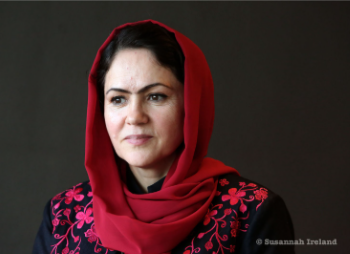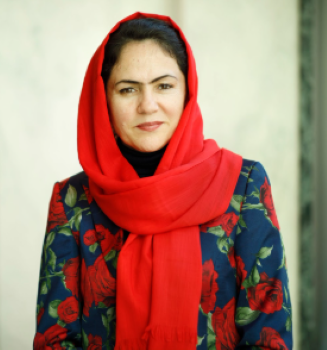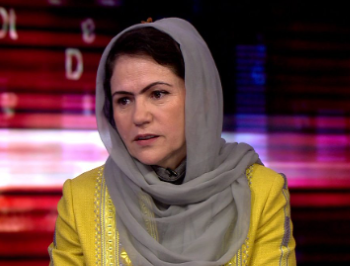
Fawzia Koofi is an Afghan politician, a human rights advocate, a writer, and a women’s rights activist.
She was born in the Badakhshan province of Afghanistan to a polygamous family. Koofi’s father was a member of parliament, which sparked her political ambitions. However, he was killed at the end of the Afghan war by the Mujahideen in 1989. From 2001 onwards, Koofi was involved in politics, as she was one of the women promoting the ‘Back to School campaign’ for Afghan girls. Her husband died in 2003 after being imprisoned for years by the Taliban. He got arrested ten days after their arranged wedding. Koofi has two teenage daughters.
Koofi was born into a polygamous family, where her father had seven wives. She was first rejected by her parents, because her mother had wanted a son, so they left her to die in the sun the day she was born. Nonetheless, she survived and was taken back by her parents. Later on, as a child, she managed to persuade her parents to send her to school, making her the first, and only, girl in her family to attend. Her dream was to become a doctor, and, after completing her baccalaureate degree, she entered a competitive medical school. However, when the Taliban came into power in 1995, they banned all women from education, forcing her to stop her studies.
When the United States invaded Afghanistan in 2001, they allowed women to go to school again, which meant that Koofi was able to return to university, where she finished a Bachelor’s degree from Kabul University in Political Science. She then continued to do a Master’s degree in International Relations and Human Rights at the Geneva School of Diplomacy.

In 2005, she got elected into the Wolesi Jirga, which is the Afghan National Assembly’s lower house. This was the first democratically elected parliament in 33 years. She was the representative for the Badakhshan district. Moreover, Koofi was the Deputy Speaker of the lower house and the Vice President of the National Assembly. The latter is especially important, as she was the first woman to hold the position in Afghan history. In addition, she was also elected MP for the women in the Afghan parliament in 2010 after her re-election.
During her time in parliament, she focused on women’s rights; however, she also managed to ensure the building of roads to connect remote villages to educational and health facilities. Moreover, Koofi worked with vulnerable groups and marginalised women and children and worked for UNICEF from 2002 until 2004 as a Child Protection Officer to protect children from exploitation, abuse, and violence.
In addition, Koofi drafted the Elimination of Violence Against Women (EVAW) legislation in 2009, which was signed as a decree. This is important, as a decree needs to be voted on in order to become an official document of the Afghan constitution. This was not the case for the EVAW, as it did not pass its presentation in 2013. Conservative members of the Afghan parliament deemed the decree to be against Islam. Nonetheless, the decree was still implemented as a law in all 34 provinces in Afghanistan, which enables its use during court cases.

In 2014, Koofi got re-elected into parliament and was the Chairperson of Afghan Women, Civil Society, and Human Rights. Here, Koofi is the leader of a newly established political party called the Movement for Change. During her life, she has had many important moments, such as in 2009, where she was selected as a Young Global Leader by the World Economic Forum, and in 2020, she supported the Afghan law, which includes women’s names on identity cards. Finally, in 2020, she was part of the 21-member team representing the Afghanistan government in the negotiation of peace talks with the Taliban. However, with the rapid withdrawals of the United States’ troops and the rapid advance of the Taliban in the summer of 2021, she stated that she felt that the United States had abandoned the women and girls of Afghanistan, saying that “Women’s rights must not be the sacrifice by which peace is achieved.”
The Taliban put her under house arrest in 2021 as soon as they captured Kabul, but Koofi managed to flee the country. Ever since, she has travelled across the world to meet human rights organisations, civil society activists, and world leaders to ensure the world does not forget about the repressed women and girls in Afghanistan.
As Koofi is a prominent woman in Afghanistan, she has survived several assassination attempts. The latest one was on the 14th of August 2020, when she was shot in the arm in a failed assassination attempt near Kabul. Koofi should be remembered not only for surviving assassination attempts, but also for standing up against the Taliban, and for her improvement of women’s rights in Afghanistan.
Koofi improved the living conditions for women in Afghan prisons, and she established the EVAW and a commission combatting the issue of violence (especially sexual violence) against children, the amendment of the Shia personal status law, meaning women are not property of men anymore and finally, she promoted education for women and children by advocating for access to schools and ensuring that opportunities are created for non-formal education in constituencies that do not have the funds for schools. She managed to do the latter by raising private funding to build schools for girls in remote provinces. Finally, in 2009, she was selected as a Young Global Leader by the World Economic Forum, and in 2020, she supported the Afghan law, which includes women’s names on identity cards. Thus, societally, Koofi ensured that women had not only a role model, but the right to go to school and to enrol in education. Importantly, she proved to a lot of people that women do belong in education, and has fought for this ever since.
Why Did I Choose to Research Fawzia Koofi?
I chose Fawzia Koofi to research after I watched a documentary about the attacks on the Twin Towers that took place on September 11th and found out about her role in human rights and women’s education in Afghanistan. After watching said documentary, I think she is an extremely interesting person, who has lived through a lot. I also empathise with her mission to ensure education for all Afghan women and girls, and her willingness to ensure that women are being seen as people rather than objects. Overall, I decided to write this piece about her as I never heard about her, and I think that should change!
Works Cited
ABC News. (31 January 2006). Guests of First Lady Laura Bush. ABC News. https://abcnews.go.com/Politics/StateOfTheUnion/story?id=1562924.
Afghan Zariza. (8 June 2014). In conversation with Fawzia Koofie, member of Parliament from Badakhshan. https://www.youtube.com/watch?v=cBZQUtCkAmg.
Gordon, B. (23 February 2012). The Taliban want to kill me but I am fighting gor my daughters’ freedom. The Telegraph. https://www.telegraph.co.uk/news/worldnews/asia/afghanistan/9098660/The-Taliban-want-to-kill-me.-But-I-am-fighting-for-my-daughters-freedom.html.
Joyce, A. (n.d.). In Her Own Words. Women’s PEace & Humanitarian Fund. https://wphfund.org/in-her-own-words-fawzia/.
Koofi, F. (27 June 2024). Let Afghan women join the UN talks next week. It’s what the Taliban fear most. The Guardian. https://www.theguardian.com/global-development/article/2024/jun/27/un-doha-summit-taliban-afghan-women-rights.
Malbrunot, G. (25 February 2011). Fawzia, un défi aux Talibans. Le Figaro. https://www.lefigaro.fr/mon-figaro/2011/02/25/10001-20110225ARTFIG00652-fawzia-un-defi-aux-talibans.php.
NPR Staff. (22 February 2012). A ‘Favoured Daughter’ Fights For the Women of Afghanistan. NPR. https://www.npr.org/2012/02/22/147060923/a-favored-daughter-fights-for-afghan-women.
Razmal Zaman. (26 May 2014). Women MP’s come together to demand equal representation. Afghan Zariza. https://web.archive.org/web/20170529195629/http://www.afghanzariza.com/2014/05/26/women-mps-come-together-to-demand-equal-representation.
This article was published on 11/11/24